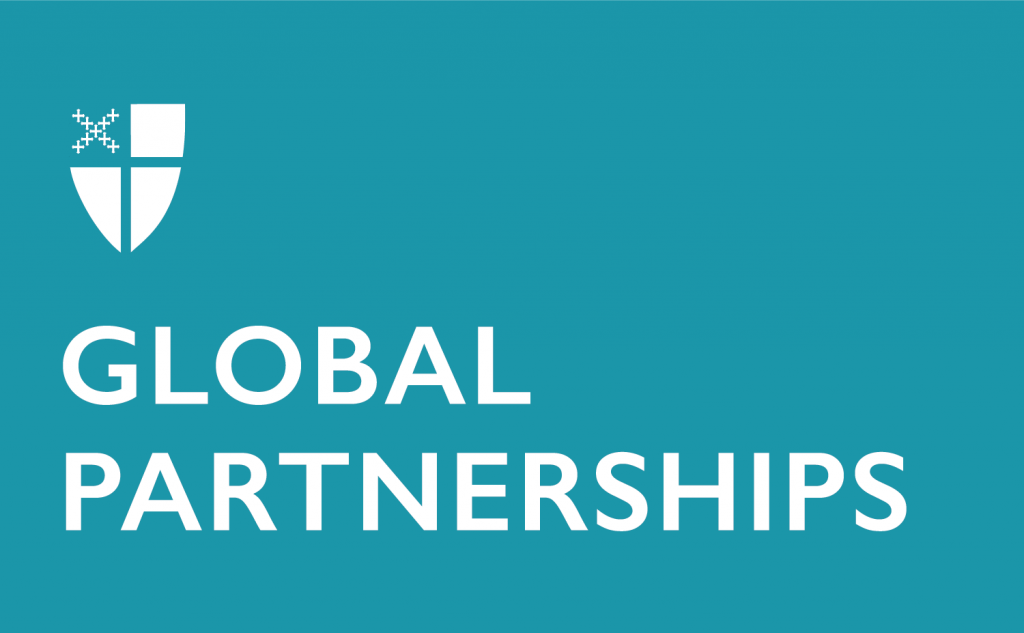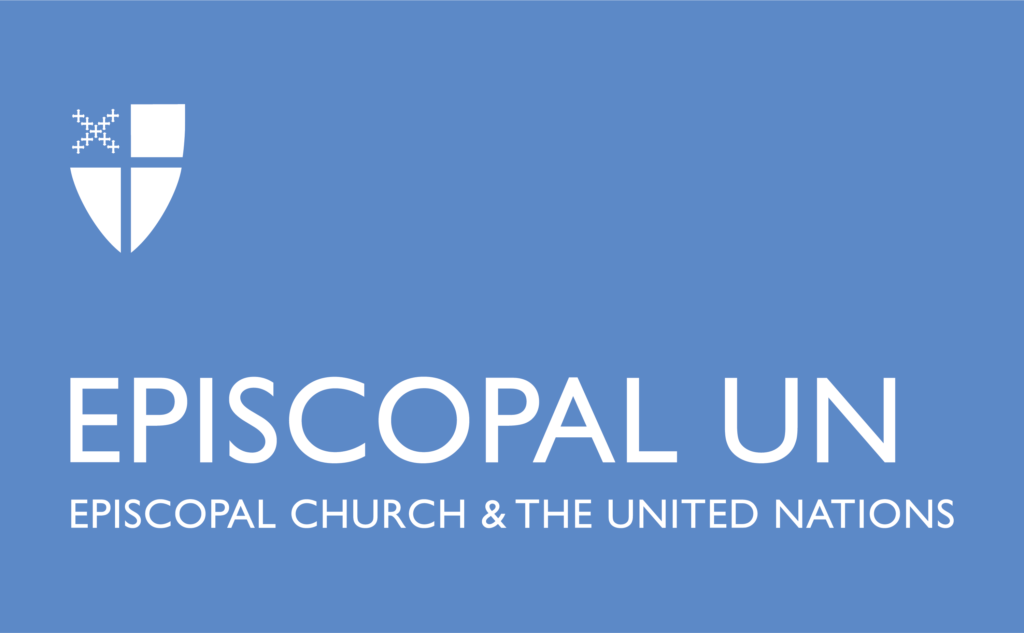There is Enough Oil, and Light
By: Erin Morey, Diocese of Pittsburgh (Province III) / Erin Morey, Diócesis de Pittsburgh (Provincia III)

For much of the past eight years, I have worked at my local domestic violence agency. At the outset of the COVID-19 pandemic, however, I found myself attending seminary full-time. When my community was ordered to shelter in place in March, my thoughts immediately turned to the women and families who are served by the shelter, as well as the staff who serve them. I contacted the shelter to see what help I could offer.
As it turned out, the agency had been planning to offer text – and chat – based helpline services. Given that people surviving intimate partner violence were now trapped with their abusers, the agency decided to rapidly move up their plans to offer this service, to help people who could not safely make phone calls a way to connect to the agency’s services. Because I already had experience working on the shelter’s hotline with survivors, they asked, would I be willing to help respond to these texts and chats?
I jumped at the chance, and am grateful to have the opportunity to serve survivors. I have seen advocates help clients craft – and use – creative safety plans to keep themselves from lethal danger. More than that, however, I have gained insight into how we are called to live our lives.
Several weeks ago, I listened to a Gospel reading, from the twenty-fifth chapter of the Gospel of Matthew, where Jesus tells a parable comparing the kingdom of God to ten bridesmaids waiting for a wedding banquet. Five of the bridesmaids are “foolish” – they come unprepared, with lamps but no oil to fuel them. So when the banquet comes, they are left scrambling to go to the store, instead of participating in the party.
This is a peculiar story. Here, we have five women with more than enough, and five with nothing. Instead of saying that the five women with more than enough ought to share, Jesus holds them up an example, and calls the women with nothing foolish. It doesn’t seem to make sense. In fact, it seems irrational and selfish. Indeed, it even seems a little sexist, the sort of Scripture that’s been historically used to justify a second-class status for women in society. When I saw that this reading was featured again, several weeks later, in the daily prayers for the Epsicopal tradition, I wondered – what does it mean?
As the COVID-19 pandemic grinds on, we, like the bridesmaids, are waiting anxiously, longer than we ever anticipated. We know that there has been a shadow pandemic of violence against women during the pandemic. We know that violence against women creates an impact that reverberates through our healthcare systems, our economies, and governments even in the best of times. How can we, as we are called to by the 2020 theme of the 16 Days of Activism against Gender Based Violence, “Orange the World: Fund, Respond, Prevent, Collect”? It may seem overwhelming to think that we are expected to change everything, unless we remember that the world as we know it is not inevitable, and we already have the tools we need to make change for good.
I am reminded of an important fact in the parable of the bridesmaids it is easy to overlook: the fact that there is not enough oil at the wedding is a distraction from the fact that there is enough oil in the community for everyone’s lamp. From the outset of the story, there was plenty of oil for sale, and the bridesmaids had the resources to purchase it. This is not a story of scarcity of oil and light. This is the story of a scarcity of will, about a failure to equip resources that already existed in abundance, to light a feast that was already in progress!
This year marked the 25th anniversary of the Beijing Declaration and Platform for Action, the most progressive blueprint ever for advancing women’s rights. Like those bridesmaids, we have been waiting anxiously, looking toward the day when we see this blueprint fulfilled. It has been a long wait, indeed, and we still live in a world where routinely women die at the hand of their partners, no matter where we live.
My experience has shown me that when employers pay women less than men, women are made financially dependent on abusive partners. When law enforcement agencies fail to test the results of forensic examinations after sexual assaults, perpetrators are free to continue violence. We must stop uncritically accepting the messages we hear in our churches, our families, our workplaces, our halls of government, and our media that women’s equality is something that’s too difficult or expensive to implement. Women’s equality is not simply a nice thing to work on when we’ve made progress on other priorities. Women’s lives are a priority. There is already enough oil in this world to create the light we need. We must not let ourselves, and our leaders, be distracted from the goal of putting that oil in our lamps.
We must be creative. We are not always able to anticipate exactly when the groom will arrive at the wedding. We must adequately fund resources for those in need, to make sure that no one will be left in the dark. We must be responsive to global changes – and be ready to creatively use new technology, such as text – chat platforms to allow people in danger to silently seek the support they need. God calls us to leave old, debilitating models based on competition and scarcity behind, and instead live into the fulfillment of abundance.
There is much work we can do towards women’s equality. We can urge our elected officials to reauthorize the Violence Against Women Act and end violence against all women, including Indigenous women. We can demand that our elected officials pass robust COVID relief legislation. You can share the National Domestic Violence Hotline number in your community, encouraging people to call if they or someone they love needs support. You can find your local domestic violence agency and make a donation or volunteer. You can learn more about the 16 Days of Activism against Gender Violence.
It is also difficult for people in abusive relationships to safely leave those relationships. It may take years or months, and multiple attempts, even under the best of circumstances. I am reminded of the need to be patient as I walk beside survivors as I try to help them safely plan through a series of obstacles that sometimes feel hopless. I know this journey does not always have an immediate solution.
The struggle to keep ending gender-based violence on your government’s legislative agenda may sometimes feel fruitless. You may find yourself terrified for the safety of a woman returning to her abusive partner for reasons that are not clear to you. Anticipating the end of systems of hatred and violence is anxious work. But, never forget – the wedding is already planned, and the groom is coming. These systems are not inevitable. And the light that comes from all of us sharing in the new relationships of love that stand against them is worth the preparation, and the wait.
About the author: Erin Morey is currently an M.Div. student at Pittsburgh Theological Seminary. Previously, she served as the Director of Community Engagement and Communications for St. Paul’s Episcopal Church, Mt. Lebanon, Pennsylvania (where she worships). She has worked for Women’s Center and Shelter of Greater Pittsburgh, Pittsburgh Action Against Rape, and the Rape, Abuse, and Incest National Network as a domestic violence and rape crisis advocate. She began her career as an attorney, serving as an Assistant Public Defender in Allegheny County, Pennsylvania. Erin was a member of the Presiding Bishop’s delegation to UNCSW in 2015 and 2016.
Hay suficiente aceite y luz
By: Erin Morey, Diócesis de Pittsburgh (Provincia III)
Durante gran parte de los últimos ocho años, he trabajado en mi agencia local de violencia doméstica. Sin embargo, al comienzo de la pandemia de COVID-19, me encontré asistiendo a seminario a tiempo completo. Cuando se ordenó a mi comunidad que se refugiara en el lugar en marzo, mis pensamientos se dirigieron inmediatamente a las mujeres y las familias que son atendidas por el refugio, así como al personal que las atiende. Me comuniqué con el refugio para ver qué ayuda podía ofrecer.
Resultó que la agencia había planeado ofrecer servicios de línea de ayuda basados en mensajes de texto y chat. Dado que las personas que sobrevivían a la violencia de su pareja íntima ahora estaban atrapadas con sus abusadores, la agencia decidió acelerar rápidamente sus planes para ofrecer este servicio, para ayudar a las personas que no podían hacer llamadas telefónicas de manera segura como una forma de conectarse con los servicios de la agencia. Como ya tenía experiencia trabajando en la línea directa del refugio con sobrevivientes, me preguntaron, ¿estaría dispuesto a ayudar a responder estos mensajes de texto y chats?
Aproveché la oportunidad y estoy agradecido de tener la oportunidad de servir a los sobrevivientes. He visto defensores que ayudan a los clientes a diseñar, y utilizar, la seguridad creativa en planes para evitar un peligro letal. Más que eso, sin embargo, he obtenido una idea de cómo estamos llamados a vivir nuestras vidas.
Hace varias semanas escuché una lectura del Evangelio, del capítulo veinticinco del Evangelio de Mateo, donde Jesús cuenta una parábola que compara el reino de Dios con diez damas de honor esperando un banquete de bodas. Cinco de las damas de honor son “tontas”: vienen desprevenidas, con lámparas pero sin aceite para alimentarlas. Entonces, cuando llega el banquete, se quedan luchando para ir a la tienda, en lugar de participar en la fiesta.
Ésta es una historia peculiar. Aquí tenemos cinco mujeres con más que suficiente y cinco sin nada. En lugar de decir que las cinco mujeres con más que suficiente deberían compartir, Jesús les da un ejemplo y llama tontas a las mujeres sin nada. No parece tener sentido. De hecho, parece irracional y egoísta. De hecho, incluso parece un poco sexista, el tipo de Escritura que se ha utilizado históricamente para justificar un estatus de segunda clase para las mujeres en la sociedad. Cuando vi que esta lectura aparecía nuevamente, varias semanas después, en las oraciones diarias por la tradición de Epsicopal, me pregunté: ¿qué significa?
A medida que avanza la pandemia de COVID-19, nosotros, como las damas de honor, estamos esperando ansiosamente, más tiempo de lo que jamás habíamos anticipado. Sabemos que ha habido una pandemia paralela de violencia contra las mujeres durante la pandemia. Sabemos que la violencia contra las mujeres genera un impacto que repercute en nuestros sistemas de salud, nuestras economías y gobiernos, incluso en los mejores tiempos. ¿Cómo podemos, como nos llama el tema de 2020 de los 16 días de activismo contra la violencia de género, “Naranja del mundo: financiar, responder, prevenir, recolectar”? Puede parecer abrumador pensar que se espera que cambiemos todo, a menos que recordemos que el mundo tal como lo conocemos no es inevitable y que ya tenemos las herramientas que necesitamos para hacer un cambio para siempre.
Recuerdo un hecho importante en la parábola de las damas de honor que es fácil pasar por alto: el hecho de que no haya suficiente aceite en la boda es una distracción del hecho de que hay suficiente aceite en la comunidad para la lámpara de todos. Desde el comienzo de la historia, había mucho aceite a la venta y las damas de honor tenían los recursos para comprarlo. Esta no es una historia de escasez de petróleo y luz. ¡Esta es la historia de la escasez de voluntad, de la falta de dotación de recursos que ya existían en abundancia, para encender una fiesta que ya estaba en marcha!
Este año marcó el vigésimo quinto aniversario de la Declaración y Plataforma de Acción de Beijing, el plan más progresista jamás realizado para promover los derechos de la mujer. Como esas damas de honor, hemos estado esperando ansiosamente, mirando hacia el día en que veamos cumplido este plan. De hecho, ha sido una larga espera, y todavía vivimos en un mundo en el que las mujeres mueren de forma rutinaria a manos de sus parejas, sin importar dónde vivamos.
Mi experiencia me ha demostrado que cuando los empleadores pagan a las mujeres menos que a los hombres, las mujeres se vuelven económicamente dependientes de parejas abusivas. Cuando las agencias policiales no prueban los resultados de los exámenes forenses después de una agresión sexual, los perpetradores son libres de continuar con la violencia. Debemos dejar de aceptar acríticamente los mensajes que escuchamos en nuestras iglesias, nuestras familias, nuestros lugares de trabajo, nuestros pasillos de gobierno y nuestros medios de comunicación de que la igualdad de las mujeres es algo demasiado difícil o costoso de implementar. La igualdad de las mujeres no es simplemente algo agradable en lo que trabajar cuando hemos avanzado en otras prioridades. La vida de las mujeres es una prioridad. Ya hay suficiente petróleo en este mundo para crear la luz que necesitamos. No debemos permitir que nosotros y nuestros líderes nos distraigan del objetivo de poner ese aceite en nuestras lámparas.
Debemos ser creativos. No siempre podemos anticipar exactamente cuándo llegará el novio a la boda. Debemos financiar adecuadamente los recursos para los necesitados, para asegurarnos de que nadie se quede en la oscuridad. Debemos responder a los cambios globales y estar preparados para utilizar de forma creativa las nuevas tecnologías, como las plataformas de chat de texto, para permitir que las personas en peligro busquen silenciosamente el apoyo que necesitan. Dios nos llama a dejar atrás los viejos y debilitantes modelos basados en la competencia y la escasez y, en cambio, vivir en la plenitud de la abundancia.
Hay mucho trabajo que podemos hacer para lograr la igualdad de la mujer. Podemos instar a nuestros funcionarios electos a que reautoricen la Ley de Violencia contra las Mujeres y pongan fin a la violencia contra todas las mujeres, incluidas las mujeres indígenas. Podemos exigir que nuestros funcionarios electos aprueben una sólida legislación de alivio de COVID. Puede compartir el número de la Línea Directa Nacional contra la Violencia Doméstica en su comunidad, animando a las personas a que llamen si ellos o alguien que aman necesitan apoyo. Puede encontrar su agencia local de violencia doméstica y hacer una donación o ser voluntario. Puede obtener más información sobre los 16 días de activismo contra la violencia de género.
También es difícil para las personas en una relación abusiva dejar esas relaciones de manera segura. Puede llevar años o meses, y múltiples intentos, incluso en las mejores circunstancias. Recuerdo la necesidad de ser paciente mientras camino junto a los sobrevivientes mientras trato de ayudarlos a planificar su seguridad a través de una serie de obstáculos que a veces se sienten sin saltos. Sé que este viaje no siempre tiene una solución inmediata.
La lucha para seguir poniendo fin a la violencia de género en la agenda legislativa de su gobierno a veces puede parecer infructuosa. Es posible que se sienta aterrorizado por la seguridad de una mujer que regresa con su pareja abusiva por razones que no le son claras. Anticipar el fin de los sistemas de odio y violencia es un trabajo ansioso. Pero, nunca lo olvides: la boda ya está planeada y el novio está por llegar. Estos sistemas no son inevitables. Y la luz que proviene de todos nosotros compartiendo las nuevas relaciones de amor que se oponen a ellos, vale la pena la preparación y la espera.
Sobre el autor: Erin Morey es actualmente M.Div. estudiante del Seminario Teológico de Pittsburgh. Anteriormente, se desempeñó como Directora de Participación Comunitaria y Comunicaciones para la Iglesia Episcopal de St. Paul, Mt. Líbano, Pensilvania (donde adora). Ha trabajado para Women’s Center and Shelter of Greater Pittsburgh, Pittsburgh Action Against Rape y Rape, Abuse and Incest National Network como defensora de la violencia doméstica y crisis de violación. Comenzó su carrera como abogada, sirviendo como defensora pública asistente en el condado de Allegheny, Pensilvania. Erin fue miembro de la delegación del obispo presidente a la UNCSW en 2015 y 2016.


